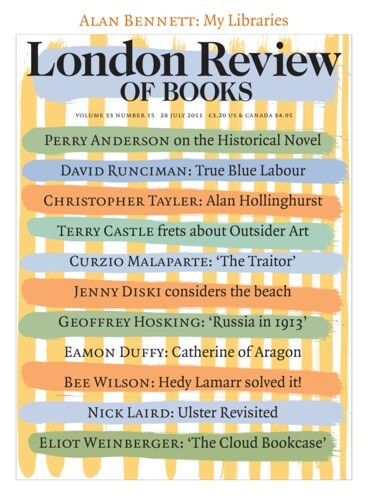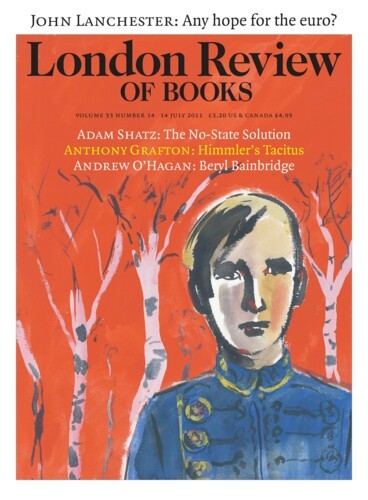Stephanie Burt
Stephanie Burt is a poet and professor of English literature at Harvard. She is the author of Randall Jarrell and His Age, The Art of the Sonnet and After Callimachus, a selection of translations, some of which were first published in the LRB. Advice from the Lights, a collection of poems, came out in 2017. Her book about Taylor Swift, Taylor’s Version, is due in October.
There are the records you like that everyone else seems to like, and the records you like that very few people have heard. And then there are the records you like that everyone else who has heard them seems to despise, the records that sank, or nearly sank, musicians' careers. At the top of that third stack, for me, is Bob Mould's modulate. Before it came out in 2002, Mould was known as an indie-rock guitarist, writing grim, angry, straightforward songs. modulate, though, was half mumbled and half AutoTuned, flipping disconsolately between dirty guitars and a low-budget version of the Pet Shop Boys, composed partly on synthesisers that sounded as if he'd just bought them; it was dance music that nobody could dance to, a collection of could-have-been hits undermined and overrun by brassily programmed samples, police sirens, bells, boxy electronic drums, and other touches that repelled a rock audience without going out of its way to grab anyone else.
Professor or Pinhead: Anne Carson
Stephanie Burt, 14 July 2011
Some writers discover their powers gradually. Others – Anne Carson, for example – spring from the head of Zeus. With three books in four years during the mid-1990s, the Canadian poet, classical scholar, essayist and translator became suddenly prominent in North America; she had found readers in Britain as well by 2001, when The Beauty of the Husband: A Fictional Essay in 29 Tangos...
Jessie and I were making our way to the Métro from the Jardin du Luxembourg when we literally stumbled – I think I tripped over a microphone cable – into the 29th annual Marché de la Poésie, an open-air, weekend-long festival of poets and poetry, with enough tents, booths, temporary stages, lecterns, folding chairs and rope lines to take up the whole of the Place Saint-Sulpice. The festival is big enough and famous enough to have developed a fringe (périphérie), a set of poetry-related events that continue until late June, in venues from the Portuguese consulate to the Halle St-Pierre in Montmartre. The organisers say that last year there were 509 exhibitors and 60,000 visitors.
When an artist who is already famous dies suddenly, tributes can start right away, and circulate rapidly; when a more obscure artist dies young, the tributes, and even the news of his death, can take much longer to reach people who like, or might like, his work. Take Nick Drake, so much better known now than when he was alive; or Keith Girdler, lead singer in the 1990s indie-pop act Blueboy, who died in 2007, from cancer. You wouldn't mistake Girdler's work for Drake's, but if you like one you'll probably like the other. There's the delicate voice just barely willing (he's clearly able) to lift and drop a melody; the spiderweb-thin bareness of some tracks, and the fluent chamber arrangements of others; the hint of rock and roll, usually just offstage. If Drake was a reticent hippie, Blueboy were reticent sophisticates; Girdler was confessing his quasi-secrets at the edge of a party too fancy for him, and for you, to feel comfortable there. Blueboy were in their time the best and the smartest proponents of a particular sort of mostly acoustic pop.
Pieces about Stephanie Burt in the LRB
Toolkit for Tinkerers: The Sonnet
Colin Burrow, 24 June 2010
Sonnets have no rival. They’ve been written about kingfishers, love, squirrels, the moon (too often), God, despair, more love, grief, exultation, time, decay, church bells beyond the stars...
Read anywhere with the London Review of Books app, available now from the App Store for Apple devices, Google Play for Android devices and Amazon for your Kindle Fire.
Sign up to our newsletter
For highlights from the latest issue, our archive and the blog, as well as news, events and exclusive promotions.



